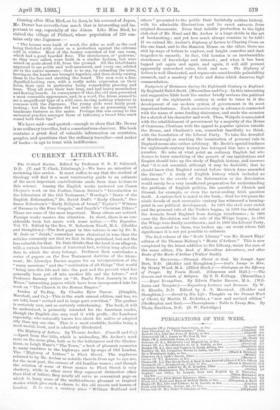Footprints of Statesmen during the Eighteenth Century in England. By
Reginald Baliol Brett. (Macmillan and Co.)—In this interesting and suggestive little book the author briefly reviews the political history of the eighteenth century in order to trace in it the development of our modern system of government in its most important features. Each successive step in advance is connected with the name of some leading statesman, and made the occasion for a sketch of his character and work, Thus, Walpole is associated with the establishment of government by a majority of the House of Commons, Chatham with the appeal to popular opinion outside the House, and Chatham's son, somewhat fancifully we think, with the foundation of the Liberal Party. To take the downfall of Marlborough as marking the termination of personal rule in England seems also rather arbitrary. Mr. Brett's special fondness for eighteenth-century history has betrayed him into a curious paradox. He asks at what point an ordinary English lad who desires to know something of the growth of our institutions and Empire should take up the study of English history, and answers that "it is not essential, although it may be desirable, that he should know that England existed before Queen Anne ascended the throne." A study of English history which included no reference to the events of the Reformation or the Revolution would surely be a very insufficient preparation for understanding the problems of English politics, the question of Church and Dissent, for example, or even the never-ending Irish question itself. A curious fact is noted in the book, that for 600 years the ninth decade of each successive century has witnessed a turning- point in our political development. In 1485 the civil wars ended and the personal rule of the Tudors began ; in 1588 the defeat of the Armada freed England from foreign interference ; in 1688 came the Revolution and the rule of the Whigs began ; in 1784 the Whigs were finally overthrown ; and in 1886 the Liberal Party, which succeeded to them, was broken up,—an event whose full significance it is not yet possible to estimate.


















































 Previous page
Previous page